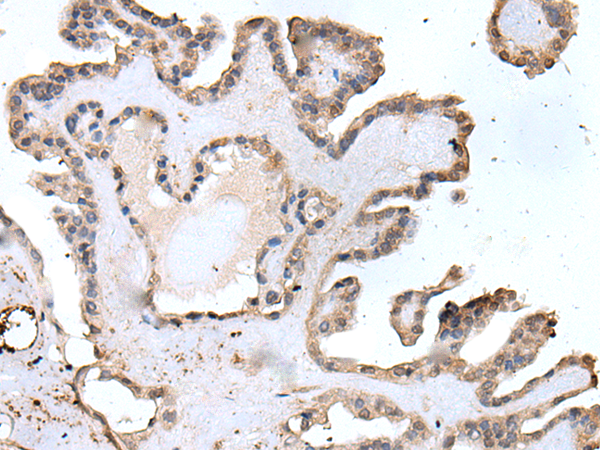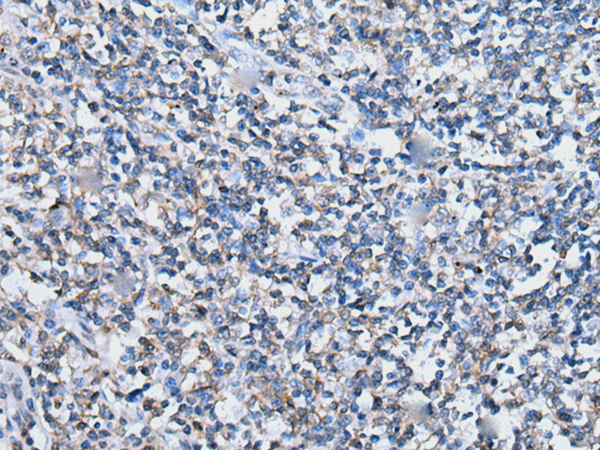

| WB | 咨询技术 | Human,Mouse,Rat |
| IF | 咨询技术 | Human,Mouse,Rat |
| IHC | 1/20-1/100 | Human,Mouse,Rat |
| ICC | 技术咨询 | Human,Mouse,Rat |
| FCM | 咨询技术 | Human,Mouse,Rat |
| Elisa | 1/5000-1/10000 | Human,Mouse,Rat |
| Aliases | RDC1; CXCR7; RDC-1; CMKOR1; CXC-R7; CXCR-7; GPR159 |
| Host/Isotype | Rabbit IgG |
| Antibody Type | Primary antibody |
| Storage | Store at 4°C short term. Aliquot and store at -20°C long term. Avoid freeze/thaw cycles. |
| Species Reactivity | Human, Mouse, Rat |
| Immunogen | Synthetic peptide of human ACKR3 |
| Formulation | Purified antibody in PBS with 0.05% sodium azide and 50% glycerol. |
+ +
以下是关于ACKR3抗体的3篇参考文献及其摘要的概括:
1. **"Atypical chemokine receptor ACKR3/CXCR7 is a broad-spectrum scavenger for opioid peptides"**
- **作者**: Meyrath M 等 (2020)
- **摘要**: 本研究揭示了ACKR3作为阿片肽的非典型清除受体,通过开发特异性抗体证实其在调节神经信号传导中的关键作用,为疼痛管理和药物开发提供了新靶点。
2. **"ACKR3 regulates platelet activation and ischemia-reperfusion tissue injury"**
- **作者**: Chatterjee M 等 (2019)
- **摘要**: 利用ACKR3抗体阻断实验,发现ACKR3通过调控血小板活化和炎症反应加剧缺血再灌注损伤,提示其作为心血管疾病的潜在治疗靶点。
3. **"Targeting ACKR3 in breast cancer control and metastasis"**
- **作者**: Luker KE 等 (2016)
- **摘要**: 研究通过抗ACKR3抗体抑制实验,证明ACKR3在乳腺癌转移中促进血管生成和细胞侵袭,为抗体靶向治疗提供了临床前证据。
这些文献涵盖了ACKR3抗体在神经调控、心血管疾病及癌症治疗中的机制与应用研究。如需具体文章,建议通过PubMed或Web of Science检索标题或作者进一步获取全文。
ACKR3 (Atypical Chemokine Receptor 3), also known as CXCR7. is a G protein-coupled receptor (GPCR) initially classified as a chemokine receptor due to its ability to bind chemokines CXCL12 and CXCL11. Unlike canonical chemokine receptors (e.g., CXCR4), ACKR3 lacks typical signaling pathways that drive cell migration. Instead, it functions as a scavenger or decoy receptor, regulating chemokine availability by internalizing ligands or shaping chemokine gradients. This modulation influences neighboring receptors, notably CXCR4. through ligand competition or cross-talk, impacting cell signaling in processes like embryogenesis, immune response, and tissue homeostasis.
ACKR3 is highly expressed in various cancers, including breast, lung, and glioblastoma, where it promotes tumor progression, angiogenesis, and metastasis by enhancing cell survival and invasive pathways. It also plays roles in cardiovascular development, neuroinflammation, and neuronal repair. Its dual role in health and disease has made it a compelling therapeutic target.
Antibodies targeting ACKR3 are critical tools for studying its expression, localization, and function. They enable detection in tissues (e.g., via flow cytometry, immunohistochemistry) and mechanistic studies in vitro and in vivo. Therapeutic antibodies or small-molecule inhibitors are under investigation to block ACKR3 in cancer or modulate its activity in inflammatory disorders. Challenges include ensuring specificity, avoiding off-target effects on related receptors (e.g., CXCR4), and understanding context-dependent roles in different pathologies. Ongoing research aims to clarify its complex biology and translate findings into clinical applications.
×